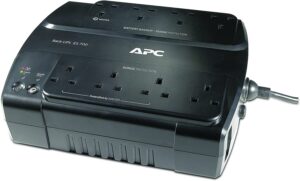Data storage systems are often highly susceptible to interruptions to their power supply. Specifically, sudden power interruptions can cause data loss, business disruption, and even personal injuries.
These interruptions can come from common occurrences, like disruption to the mains network, water damage, or power surges tripping a fuse.
Uninterruptible power supply (UPS) systems are designed to mitigate the impact of these. Specifically, UPS systems aim to provide enough of a short-term backup for devices to be shut down correctly, or switch to a stand-by power supply.
Essentially, UPS systems rely on a backup battery. When the primary power source drops below a given threshold, the UPS begins to convert its signal to an AC current, which replaces the outed power source.
This is a broad overview of the theory behind UPS systems. However, different solutions are needed for different kinds of devices.
Here are the UPS systems which Sonet can supply to businesses.
UPS System Configurations
The size of a UPS is measured in volt-amperes. We currently offer a large selection of UPS systems, ranging from 400VA to 400KVA. When choosing the appropriate size for your UPS, you begin by considering the power requirements of the device or devices you’d like to protect.
A good rule of thumb here is to multiply the wattage rating of a device by 1.6. This is the minimum VA rating that you should use.
It’s also important to note that this should be based on the total power rating of the device itself, as well as any peripherals which share a power supply. For example, if you want to protect a server tower with a UPS, you’d also have to account for the power draw of server peripherals, like external cooling systems, or even lights.
Once you’ve used this rule of thumb to determine the minimum VA that you need, the next variable to consider is run-time. Generally, this is only a few minutes. Of course, the more time a UPS system gives you to shut down your devices safely, the better.
Beyond this, there are a couple of different varieties of UPS, which are suitable for different kinds of devices. Let’s take a look.
Off-Line Uninterruptible Power Supplies
In an off-line UPS, the device itself is always fed by the mains power during normal operation. The UPS itself is also connected to the mains in order to maintain charge. If the voltage of the mains supply drops below a certain threshold, the UPS then switches automatically to the backup supply.
Off-line UPS systems are typically used to prevent power disruption to single PCs or other small to medium devices. Off-line systems are also considerably cheaper and more energy-efficient than their on-line equivalents.
However, off-line systems also have certain drawbacks which make them unsuitable for larger devices. For example, there is a minor delay between the voltage dropping, and the backup source being activated.
This is only a fraction of a second, which is not a problem for computers, or similar devices, but it makes off-line UPS systems unsuitable for more sensitive data storage devices.
Similarly, as the device is powered by main supply during normal operation off-line systems provide insufficient protection against fluctuations in the power supply for highly sensitive data storage media.

On-Line Uninterruptible Power Supplies
By contrast, on-line UPS systems are best suited to large or highly sensitive devices. Here, the device always draws its power via the battery system, which acts as an intermediary between the device and the mains.
The mains power is converted into a DC signal in the battery and then converted back into an AC signal, which powers the device. When the mains power is interrupted, the battery continues to supply the device, until its charge runs out.
This insulates the device from fluctuations, and eliminates the chance of delay between power interruptions and the backup kicking in.
On-line systems are primarily used in data centres, as well as large server rooms. The goal is to provide enough backup power, to buy time until a backup generator can be initiated.
However, this additional protection comes at a cost. Specifically, on-line UPS systems are often considerably more expensive, and much less energy efficient than on-line systems. This is still much less than the cost of data loss or operational interruptions though.
Support for UPS Systems
When purchasing UPS systems, it’s also important to consider the support options which are offered. Almost all UPS systems will come with a warranty from their manufacturer, but additional support is needed to ensure proper functionality.
Sonet offers a range of support contracts with all of our uninterruptible power supply solutions.
Support options include ongoing support, maintenance, monitoring and testing, over a variety of timeframes.
UPS Installation and Testing
Depending on the size of the device, UPS installation can be fairly simple, or much more complex. Special considerations have to be paid to how to install UPS systems while minimising or even eliminating system down-time.
Arguably, the trickiest part of UPS installation is ensuring that the actually system works. This requires controlled testing. Remember, a UPS is supposed to provide you with the peace of mind to know that your data is protected in the event of a power outage.
This means that proof of functionality is absolutely necessary. You can spend all the money in the world on a UPS system, but if it hasn’t been properly installed and tested, it will be a waste of time and money.
Sonet also holds a range of project management and health and safety certifications, ensuring that all UPS installations are delivered to the highest possible standards.
Network Solutions from Sonet
Sonet have years of experience of providing high quality network solutions, including uninterrupted power supplies for a range of small business and enterprise-level customers internationally.
UPS systems are an essential part of any network infrastructure project, especially given the rise in importance of data in everyday business operations.
To discuss the needs of your next infrastructure project, or find out the best UPS solution for your needs, contact us today and speak to one of our experienced specialists.





